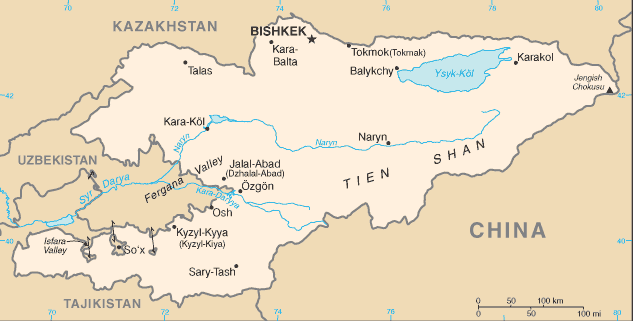 The post-Soviet republics of Central Asia have emerged as a key smuggling route for hashish making its way from Afghanistan to European markets—as well as developing their own local hashish (and opium) production. As ever, the illegal economy is breeding destructive gunplay throughout the region. But in these authoritarian nations, proosals for legalization have been marginalized—until now.
The post-Soviet republics of Central Asia have emerged as a key smuggling route for hashish making its way from Afghanistan to European markets—as well as developing their own local hashish (and opium) production. As ever, the illegal economy is breeding destructive gunplay throughout the region. But in these authoritarian nations, proosals for legalization have been marginalized—until now.
The glimmer of hope comes from Kyrgyzstan—among the less stable of the Central Asian states, having witnessed a cycle of revolution and counter-revolution since independence from the USSR.
In late August, President Almazbek Atambayev's cabinet was rearranged, as his prime minister stepped down to run for president in October's elections. Among the beneficiaries of the shake-up is Tolkunbek Abdygulov, the former chief of the National Bank, who now rises to the post of deputy prime minister. And Abdygulov made local headlines earlier this year by suggesting—on national TV, no less—that legalizing cannabis would be a good way to boost Kyrgyzstan's tourism revenues.
Speaking in May at a televised conference entitled "National Strategy for Sustainable Development of Kyrgyzstan Until 2040," Abdygulov painted Kyrgyzstan as a potential Netherlands of the Commonwealth of Independent States, the community of post-Soviet countries.
Abdygulov told a shocked audience: "How to create a tourist heaven in Kyrgyzstan? If you’re, for instance, neoliberals, then think about creation of effective trademark. I know how to bring all the tourists here—legalize marijuana. That’s it. That’ll do. The entire CIS will travel [to] Kyrgyzstan, no empty rooms in hotels will be left. That’s a trademark."
Officials later tried to dismiss Abdygulov's recommendation as a joke. And he may have to step down as deputy prime minister depending on the outcome of the October elections. But having even a slightly tongue-in-cheek a legalization advocate in a top cabinet post gives the idea a currency unprecedented in the Central Asian region.
And Abdygulov wasn't the first. Jenishbek Nazaraliev, a former presidential candidate who has long run a clinic for opiate addicts in the Kyrgyz capital Bishkek, is an open and serious advocate of cannabis legalization as a way out of the country's drug crisis.
Nazaraliev has called for a pilot program for legal production of cannabis at a site near Lake Issyk-Kul in the northern Tian Shan mountains. When he unveiled the proposal in 2014, he decried that the cannabis market in Kyrgyzstan is now "fully controlled by the black economy," and asked whether whether "progressive European countries" and US states like Washington and Colorado might not have abetter approach.
Kyrgyzstan could badly use both greater economic indpendence and greater stability. In their Great Game for control of Central Asia, Russia, the United States and China alike have treated Kyrgyzstan has a piece on the chessboard, vying for access to military bases and the loyalty of the country's leaders. A self-sufficient economy could better position the country to resist such pressures. And undercutting the narco networks with legalization could deprive outside powers of armed underground networks to exploit to make trouble.
Cross-post to High Times







Recent comments
3 weeks 6 hours ago
3 weeks 13 hours ago
6 weeks 1 day ago
7 weeks 13 hours ago
11 weeks 20 hours ago
14 weeks 6 days ago
18 weeks 6 days ago
19 weeks 4 days ago
29 weeks 4 days ago
33 weeks 5 days ago